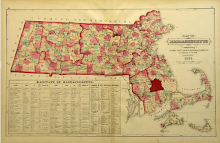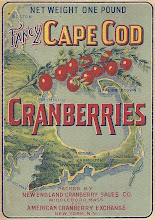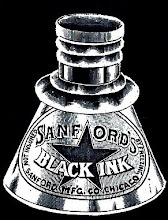
Wednesday, September 9, 2009
Lakeville Hog Mistaken for Black Bear, 1889
.


During the early autumn of 1889, southeastern Massachusetts, and Plymouth County in particular, was in an apprehensive state, the consequence of a black bear which was on the loose and reported roaming the countryside. While black bears certainly had not been unknown in this section of Massachusetts, by 1889 their range had largely been reduced to the central and western portion of the state and Old Colony residents typically had little to fear from the animal.
On October 26, 1889, however, the Plymouth Old Colony Memorial reported that a bear had earlier escaped its owner and trainer and had "been roaming the woods around Rockland and Weymouth for some time." A few nights preceding this report, the bear had been sighted by a train crew travelling between South Weymouth and South Braintree. "The train was stopped and the big brute growling stepped into the woods. He has done some damage to stock, and is likely to do more.... Winter with its cold and snows impels him to desperate measures in providing for his expansive appetite."
Closer to Middleborough and Lakeville, milkman A. H. Stone who resided at the common in Berkley, reported seeing a bear on the night of Saturday, October 19, "nosing among the milkcans near the door.... Seeing the open door Bruin started for it and was set upon by [Stone's] dogs. One got knocked a long way and had his scalp about torn off. By this time the door was shut, and the bear failing to open it, started off for the woods. Stone fired several shots at him but thinks he did not hit. Taunton gunners have been to look for him, but so far without success."
A bear on the loose likely to depredate livestock and late crops, and dangerous to those who might encounter it unexpectedly, filled local communities with unease and a bounty was accordingly offered for the bear. This, in turn, led to some amusing consequences, one of which was left on record as concerning an unnamed Lakeville resident.
Not long ago, a Lakeville man who read about the multitudinous bear which has solved the problem of being in several places in the woods of the Commonwealth at the same time, went to bed dreaming of $75 rewards, bears, guns, fur coats, bear steak and other Nimrodical adjuncts. He was awakened by a peculiar noise in his door yard and in the dim, uncertain light, saw a big animal moving about. The bear had surely come to be shot! He got his gun, turned it loose on the creature, and being satisfied that he had hit it, considered discretion the better part of valor and stayed in the house until daylight. Then he went out to view his game, and danced and swore when he found out he had shot his hog which had got loose during the night.
The bear, in fact, was shot some two weeks later at Norton by farmer Jonathan D. Oakes, following which the Old Colony Memorial proclaimed "Dead! Dead!! Dead!!! The bear which has been everywhere in the county at once is dead.... The large bear was perfectly black, savage in appearance and had probably never been in captivity. It weighed 415 pounds and measured 5 feet, 11 inches when standing on its hind legs." The Memorial failed to comment on the anomaly that the bear which was attributed as having created such disruption had reportedly escaped captivity the previous month on the South Shore, while the bear shot at Norton "had probably never been in captivity." In all likelihood, there was probably more than one bear, a circumstance which would have explained the bear's seeming ability to be in several places at once.
Illustration:
"American Black Bear (Ursus americanus)", John James Audbon, The Viviparous Quadrupeds of North America, lithograph, 1845-48.
Sources:
Old Colony Memorial, October 26, 1889; November 9, 1889; November 16, 1889
Subscribe to:
Post Comments (Atom)






















+of+Smoky+Mountains+018.jpg)
0 comments:
Post a Comment